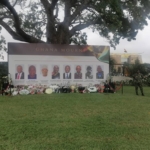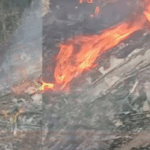
The High Cost of Ignoring Reformers While They Still Breathe.
There is a truth, measured not in emotion, but in lived reality, that quietly undercuts the splendour of national pride and ceremonial ritual. It is the truth that across Africa and much of the world, societies have mastered the art of posthumous praise while neglecting the duty of present support.
We are often more eloquent in eulogies than we are in policies. We honour heroes most fervently when their voices are no longer around to ask for help, question authority, or request reform. With every celebrated passing, a familiar pattern resurfaces: we decorate those we once disregarded, we elevate those we underfunded, and we immortalise those whose existence we barely acknowledged.
It is a sorrowful cycle, poetic in form, tragic in substance. And in the wake of these silent exits, two enduring questions remain:
Was the sacrifice worth it? Will it ever truly matter?
Statues for the dead, silence for the living
Across the continent, national recognition often arrives too late, etched in marble, but absent from memory when it mattered most. We are proficient at naming streets after the departed, yet hesitant to open doors for the living. Our commemorations are grand; our commitments, however, are slow and scattered.
Educators who shaped presidents, scientists who battled invisible enemies, reformers who stood against tides of complacency, these are the real architects of progress. Yet, in life, they are often left navigating institutional indifference armed only with conviction.
Their ideas are sidelined, their courage overlooked. In death, however, they become our national metaphors, quoted, celebrated, and sometimes sainted. It is a contradiction we have yet to confront with honesty.
We fund funerals, not visions. We erect statues, not systems of support
The story of Dr. Ameyo Stella Adadevoh is both heroic and haunting. In 2014, as Nigeria stood on the brink of a health crisis, she took a resolute decision to quarantine the country’s Ebola index patient, despite lacking a protective legal framework or institutional cover. Her action likely prevented a catastrophe.
But she did so alone, armed with integrity, not infrastructure. Her name is now etched into national memory, honoured posthumously across platforms. Yet in her moment of greatest need, she stood unsupported, without legal shield or financial backing.
Her courage was real, but so was the solitude in which it operated. This is not a Nigerian story alone. It echoes across Ghana, Kenya, Ethiopia, South Africa, and far beyond. It is a reflection of a broader systemic culture: one where society waits for silence before offering support, and where legacies are celebrated only when the weight of responsibility has passed.
We export heroes, then import praise
Africa is not short of heroes. What it often lacks is the conviction to celebrate them while they are still among us. Take Professor Wangari Maathai, the late Kenyan environmentalist and Nobel Peace Prize laureate.
Long before she earned global acclaim, she was mocked, arrested, and marginalised in her homeland. National recognition only followed international validation; a troubling pattern that raises an inconvenient question: Why must African excellence await global endorsement before it is recognised at home? We are often quicker to eulogise our heroes on international news networks than to empower them within national policy frameworks.
We delay honour until history leaves us no choice. We wait until greatness dies before documenting it. We delay honour until legacy is no longer negotiable.
Poetic paradoxes and institutional betrayals
Every African country has its unsung nation-builders: teachers who shaped future presidents, engineers who laid the foundations of skylines, and civil servants who defended the democratic process.
Many die in obscurity, nameless, penniless, and largely invisible to the very states they helped shape. The applause begins only after the breathing stops. Our institutions are structured to revere the dead but sideline the living. Awards are conferred when it is safest, after the call for reform has died alongside its champion.
We bury courage and reward compliance. We punish those who live by principle, only to later romanticise their bravery.
When courage is silenced
The late Ahmed Hussein-Suale, a Ghanaian investigative journalist, was tragically murdered in 2019 following his undercover work exposing corruption in football. His bravery triggered swift public outrage. But what followed was a deafening institutional silence.
During his mission, there were few protective structures. After his death, there were many speeches but little systemic change.
We expect heroes to rise without shields, only to offer medals once they fall. We shout praise where once we whispered indifference. Funeral tributes too often become poetic apologies. In life, we overlook their ideas. In death, we mourn their absence.
If gratitude begins at death, it was never gratitude
A nation’s gratitude should never depend on mortality. When we only recognise value after death, we convert appreciation into guilt. The scientist is fighting neglected diseases.
The teacher serves underserved communities. The civil servant refuses bribes. These are the roots of national transformation. Yet we celebrate influencers more than innovators. We quote slogans, not solutions. In doing so, we slowly dismantle the very architecture of long-term development.
What history doesn’t forget, we shouldn’t either
The brilliant Dr. Tewolde Berhan Gebre Egziabher, an Ethiopian scientist and policy negotiator, was a pioneer in shaping Africa’s position on biodiversity and biosafety.
Globally revered, his work protected African nations from the exploitative patenting of indigenous knowledge. Yet domestically, his contributions barely made headlines. Today, his name is scarcely mentioned, despite shaping environmental policy for a generation.
Legacy is not what we build after someone dies. It is what we refuse to break while they live. Across boardrooms, classrooms, laboratories, and policy units, countless individuals continue to give their best to society. They work in anonymity, not seeking fame, but committed to purpose. These individuals should not be invisible in their prime, only to be hailed in eulogies later.
The cost of neglect is generational
When a society consistently fails to acknowledge its living heroes, it sends a dangerous message to the next generation:
- That integrity leads to isolation.
- That sacrifice brings suffering.
- That courage invites punishment.
And so, talent turns away. Idealism fades. Bravery recedes into conformity. Youth see that silence ensures survival, while boldness guarantees marginalisation. If we only honour the dead, the living may stop striving altogether. If we fail to support our heroes in life, we risk losing the very mentors future generations need.
Another name lost: Koitalel Arap Samoei
Consider Koitalel Arap Samoei, the spiritual and military leader of the Nandi resistance against British colonialism in Kenya. He led his people for over a decade but was assassinated in 1905 under a flag of truce. For years, his sacrifice was overshadowed in official narratives.
Only recently has his legacy begun receiving the public recognition it deserves, generations too late. We must ask: how many more stories are still buried?
Let us reform while they still breathe
This truth, however inconvenient, is not immutable. We can choose to honour differently, to remember in real time. Societies thrive when they acknowledge greatness as it unfolds, not just after the curtain falls. It is time to institutionalise respect, not just express it.
Let us:
- Reconfigure national honours to reflect living contributions, not just historical symbolism.
- Allocate special pensions, healthcare, and public advisory roles for verified public servants who demonstrate integrity and excellence.
- Establish legacy mentorship programmes, enabling our elders to pass down wisdom, not just be remembered in archives.
- Document achievements as they occur, ensuring history is lived, not lost.
Celebrate the living, inspire the future
When we celebrate the living, we do more than acknowledge individual achievement; we ignite a chain of hope. Heroes who are seen become role models. Role models create continuity.
Continuity fosters progress. We must shift from creating martyrs to nurturing mentors. From romanticising sacrifice to rewarding impact. By elevating today’s reformers, we create tomorrow’s trailblazers. We honour not just individuals, but the values they represent.
Conclusion: It must matter before it ends
In moments of national grief, we often say: “We thank them for their service.” But service, like truth, must be valued in real time.
Not in mourning. Not on marble plaques. Not only after they are gone. The next fallen hero will leave behind two questions: Was it worth it? Will it matter?
Let us not wait for another obituary to answer. Let us act with sincerity and urgency to show that their service mattered when it counted. Let us honour the brave not in death, but in decision-making.
Not in grief, but in gratitude. Not in history books alone, but in policies, protections, and platforms. Because if we continue to decorate the coffins of the courageous while ignoring their cause while they breathe, we are not just being neglectful, we are architecting our own decline.
And history, no matter how poetic our speeches or how tall our statues, will not forget that truth.
- President Commissions 36.5 Million Dollars Hospital In The Tain District
- You Will Not Go Free For Killing An Hard Working MP – Akufo-Addo To MP’s Killer
- I Will Lead You To Victory – Ato Forson Assures NDC Supporters
Visit Our Social Media for More




